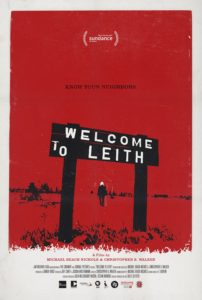Documenting the Monster Next Door
Directors: Christopher K. Walker & Michael Bean Nichols/2015
 A good horror movie taps into real and present fears, rooted in where we live. By that definition the documentary Welcome to Leith is one of the most frightening movies of 2015.
A good horror movie taps into real and present fears, rooted in where we live. By that definition the documentary Welcome to Leith is one of the most frightening movies of 2015.
Leith, North Dakota was a nearly dead town in 2012, with a total of 24 residents (children included), one business, and no discernible infrastructure. What it had was a close knit citizenry and a lot of property that could be had cheaply. And suddenly, it had a buyer interested in acquiring that property. The citizens of Leith did not initially know that their new neighbor, the quiet older man with the shaggy white hair, was a well known white supremacist. Craig Cobb has spent much of his adult life dreaming of establishing a white separatist community and saw down-on-its-luck Leith as ripe for the picking.
Filmmakers Christopher K. Walker and Michael Bean Nichols have created a taut, suspenseful thriller about the battle for the soul of a tiny town. Cobb sells land to other high profile white supremacists, but only succeeds in bringing one family of followers to town. Kynan Dutton seems like a sorry excuse for Cobb’s right hand man – a scrawny, inarticulate ex-soldier. But the other citizens of Leith see Cobb and Dutton as real threats – not only in their quest to take over the city government, but with their profanity filled rants and strolls through town toting rifles.
 With his soft, smooth voice and positive view of genocide, Cobb is a truly repugnant figure. But even repugnant people have rights, and there are moments in Welcome to Leith when the the angry and frightened residents of Leith may have gone too far in their attempts to drive Cobb out.
With his soft, smooth voice and positive view of genocide, Cobb is a truly repugnant figure. But even repugnant people have rights, and there are moments in Welcome to Leith when the the angry and frightened residents of Leith may have gone too far in their attempts to drive Cobb out.
Walker and Nichols don’t turn those residents into heroes, to their credit. What is most frightening is not so much what will happen in one small town’s government, but the outsized influence that a man like Cobb can have.
At one point, awaiting trial for terrorizing people with his rifle, Cobb suggests that he’s just a cantankerous old man, and that there are an “infinitesimal” number of people who share his beliefs – so why can’t the government just let them alone?
But he’s more than a ineffectual old crank. In 2003, when U.S. District Judge Joan Lefkow was being targeted by white supremacists, Cobb published Lefkow’s home address, photographs and a map to her home online. Lefkow’s husband and mother were subsequently murdered in her home, an act Cobb said he thought was “well done”. Just this week Frazier Glenn Miller received the death penalty for the 2014 murders of three people at Jewish centers in Kansas City. Miller is a long time friend and supporter of Cobb, a man Cobb says he sees as an older brother or father figure.
 The poisonous philosophy that Cobb promotes is not harmless. The number of true white supremacists may be small, but they’ve been behind a disproportionate number of crimes: murders at synagogues, Sikh temples, and this summer at Emmanuel A.M.E. Church in Charleston, South Carolina. Leith feels like a microcosm for the world we live in – one in which hostility toward racial, ethnic and sexual minorities is on the rise. A few days ago three of the Republican candidates for president attended a religious liberty conference at which capital punishment for homosexuals was a subject of serious discussion. The Republican front runner capitalizes on anger toward immigrants, and two supporters invoked him (“Trump was right. All these illegals need to be deported.”) after beating and urinating on a homeless man. Perhaps not surprisingly, Craig Cobb himself admires Donald Trump and has recently tried to establish another community to be named “Creativity Trump”.
The poisonous philosophy that Cobb promotes is not harmless. The number of true white supremacists may be small, but they’ve been behind a disproportionate number of crimes: murders at synagogues, Sikh temples, and this summer at Emmanuel A.M.E. Church in Charleston, South Carolina. Leith feels like a microcosm for the world we live in – one in which hostility toward racial, ethnic and sexual minorities is on the rise. A few days ago three of the Republican candidates for president attended a religious liberty conference at which capital punishment for homosexuals was a subject of serious discussion. The Republican front runner capitalizes on anger toward immigrants, and two supporters invoked him (“Trump was right. All these illegals need to be deported.”) after beating and urinating on a homeless man. Perhaps not surprisingly, Craig Cobb himself admires Donald Trump and has recently tried to establish another community to be named “Creativity Trump”.
Donald Trump would denounce Craig Cobb, of course, just as he denounced his “passionate” followers who beat the homeless man. But supremacist philosophies attract dangerous and violent people, even when spouted by celebrities. The chilling musical score in Welcome to Leith drives home how easily comfortable environs can be destroyed when hatred moves into the neighborhood.
Welcome to Leith is screening as part of the St. Louis International Film Festival: Thursday, November 12, 7:15 at the Tivoli Theater

